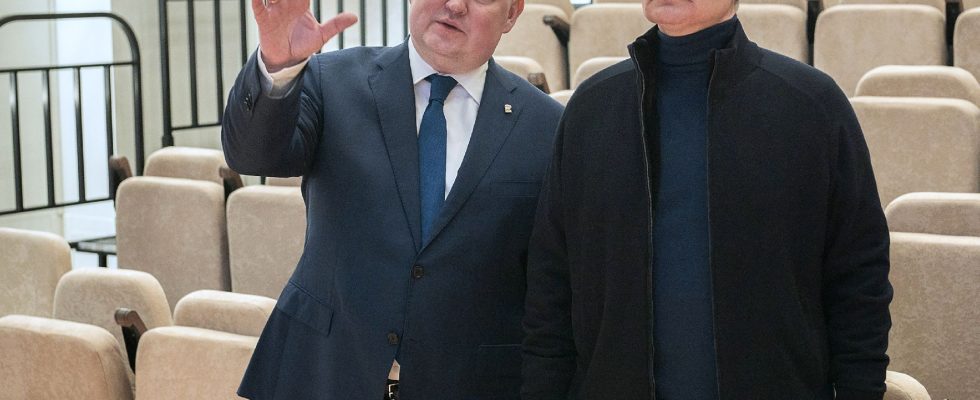Vladimir Putin has been targeted since Friday March 17 by an arrest warrant issued by the International Criminal Court (ICC), which accuses him of a war crime of “illegal deportation” of Ukrainian children. It was issued on the day Moscow and Beijing unveiled Chinese leader Xi Jinping’s visit to Russia next week, which is meant to usher in a “new era” in relations between the two allies.
This visit will take place from March 20 to 22, a little over a year after the launch of the Russian offensive in Ukraine which led the Kremlin to reorient itself towards China, amid tensions with the West which supports the ‘Ukraine. Last month, China sought to establish itself as a mediator by issuing a document urging Moscow and kyiv to hold peace talks.
Vladimir Putin visited Mariupol
Vladimir Putin visited Mariupol, a Ukrainian city besieged for months by Russian forces – before falling in May 2022 – and devastated by bombing, the Kremlin reported on Sunday March 19. He went there by helicopter and then took a tour of the city at the wheel of a car, said the press service of the presidency, quoted by Russian news agencies. Vladimir Putin spoke with residents, visited places of interest and was presented with a report on the reconstruction works of this devastated city, according to the same source.
This surprise visit to Mariupol is above all the first trip of the master of the Kremlin to the Donbass, in the conquered zone, since the start of the Russian offensive on February 24, 2022, which earned Moscow a series of severe international sanctions.
According to the Kremlin, before going to Mariupol, Putin also held a meeting in Rostov, Russia, with Russian military officials, including Chief of General Staff Valery Gerasimov. He had previously traveled to Crimea on Saturday for the 9th anniversary of the annexation of this Ukrainian peninsula by Russia, also targeted by international sanctions for this reason. It was his first visit to Crimea since 2021.
Two civilians killed and ten injured in strikes in Kramatorsk
Two civilians were killed and ten injured by Russian strikes with “cluster munitions” on Saturday afternoon in Kramatorsk, eastern Ukraine, announced Pavlo Kyrylenko, the governor of the Donetsk region. The strikes hit a park, a funeral goods store as well as a dozen residential buildings and two cars, he said on Telegram.
“More than a hundred countries ban the use of cluster munitions, but Russia continues to use these weapons which release many smaller bombs and indiscriminately injure civilians”, denounced Pavlo Kyrylenko. A few hours earlier, the mayor of Donetsk, Alexander Gontcharenko, had reported two people killed and 8 injured, including 3 seriously, “consequences of the bombardment of Kramatorsk with cluster munitions”. “Russia continues to reign terror,” castigated the city councilor on his Facebook page.
Arrest warrant against Putin: an “extremely important” decision for Paris
The issuance Friday by the International Criminal Court (ICC) of an arrest warrant against Vladimir Putin for war crimes in Ukraine is an “extremely important” decision, considers the French Minister of Foreign Affairs, Catherine Colonna, in a interview at Sunday newspaper this Sunday.
“This decision is extremely important because it means that anyone responsible for war crimes or crimes against humanity will have to be held accountable, regardless of their status or rank,” said the head of French diplomacy. “No link in the chain can now think that they will escape justice and that should lead many to think,” she continues. “So it’s a decision that can change the course of events.”
The decision by the ICC, which sits in The Hague, concerns the “deportation” of thousands of Ukrainian children to Russia since the start of the conflict with Ukraine a year ago, which constitutes a war crime.
Russia accepts extension for only 60 days of the Ukrainian grain agreement
Moscow has accepted an extension of the agreement on the export of Ukrainian grain for only 60 days, and not 120 as indicated by Kiev, a spokeswoman for the Russian Foreign Ministry said on Saturday.
“We see statements from different parties that the grain agreement has been extended by 120 days,” said Maria Zakharova, quoted by the Russian agency Interfax. “We have repeated several times that […] the Russian side had informed all stakeholders that the agreement was extended for 60 days.”
